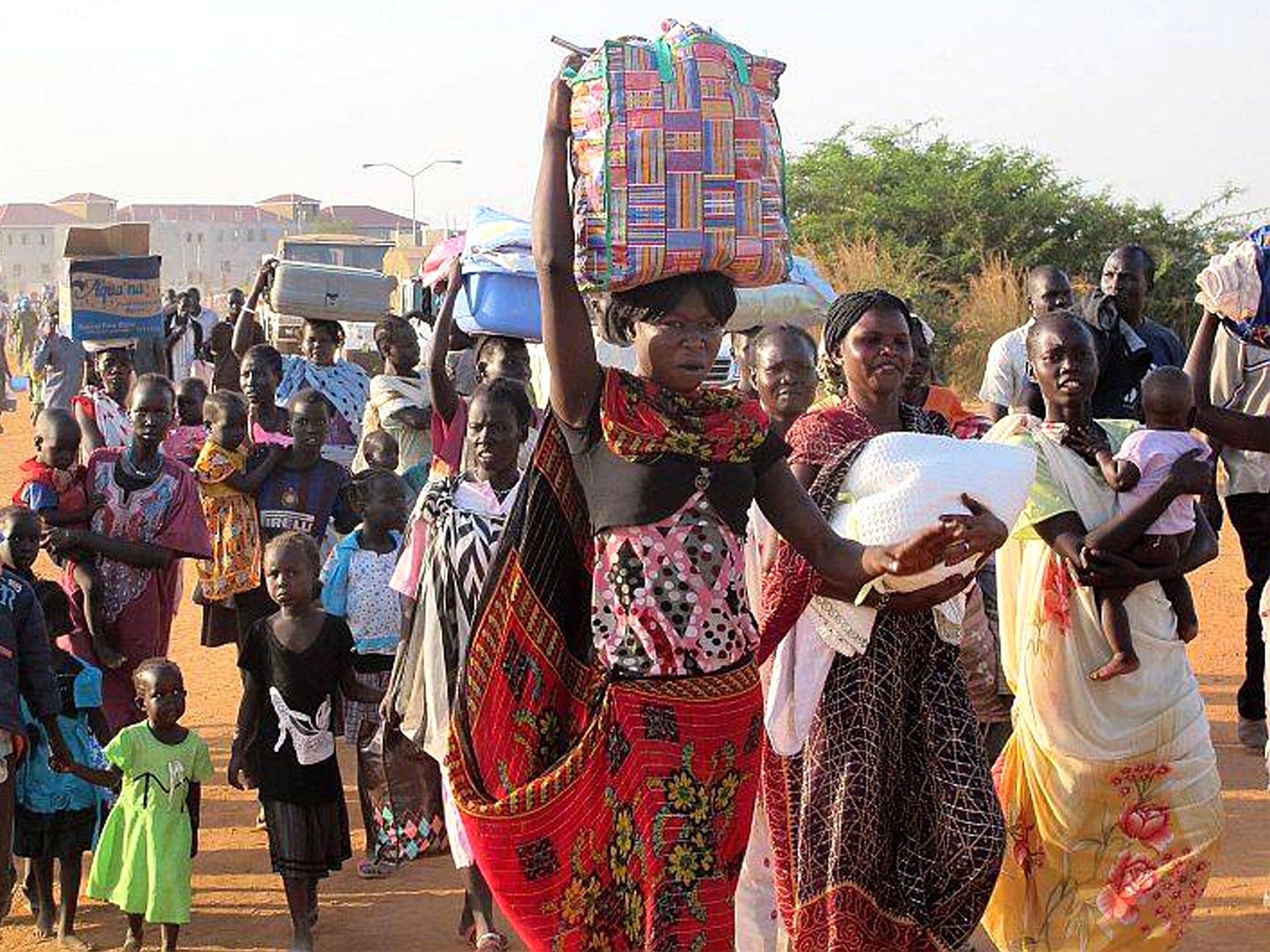A new nation with old hatreds: More than 500 people feared dead after 'failed coup' in South Sudan
Thousands have fled from their homes after violence erupted in the world’s newest country. Peter Popham examines the rivalry behind the conflict

South Sudan, the world’s newest nation, is in flames this week with up to 500 people feared dead after what its President described as “a failed coup.”
Some 20,000 people in the capital, Juba, fled from their homes to take shelter with the United Nations after rival divisions of the Republican Guards reportedly began shooting at each other on Sunday. Parts of the city are said to have been reduced to rubble by the fighting, which today spread to the town of Bor, north of the capital. Behind the fighting is ethnic rivalry which, according to one South Sudanese military official, threatens to tear the country apart.
The new country was forged with high hopes in a referendum in 2011, after decades of civil war. But an oil blockade enforced by Sudan’s government in Khartoum has undermined the development of democratic institutions in what is essentially a one-party state. The decision by President Salva Kiir, who led the new nation into independence in 2011, to sack his deputy, Riek Machar, in July provoked a political and military rift which today leaves South Sudan teetering on the edge of serious conflict. Mr Kiir belongs to the Dinka tribe, while Mr Machar is from the Nuer tribe.
President Kiir said that the fighting on Sunday broke out after what he called a “failed coup attempt” by soldiers loyal to Mr Machar, and that the former Vice President was now the subject of a manhunt. Foreign Minister Barnaba Marial Benjamin said that Mr Machar had gone into hiding. “If he wants to become President, he needs to wait for elections,” Mr Benjamin added. “He wants to be President, but in the wrong way.”
Mr Machar denies involvement in a coup, according to an article in the Sudan Times. “There was no coup,” he said. “What took place in Juba was a misunderstanding between presidential guards within their division. It was not a coup attempt. I have no connection with or knowledge of any coup attempt.” He added, “Someone wanted to frame me. I had to flee. They are hunting me down.”
The sudden eruption of violence left the international community struggling to provide assistance to the many victims. “Thousands of victims, including women and children, have fled their homes in search of safety,” the International Committee of the Red Cross (ICRC) said in a statement.
“The ICRC is providing the city’s two major hospitals with support so they can cope with the heavy influx of patients. More than 300 people have been admitted... over the past two days.”
Britain’s Foreign Office said that its embassy in Juba remains open but that it was pulling some embassy staff and their dependants from the country in response to the violence. The United States said it had ordered all non-essential embassy staff out of the country immediately.
Ahmed Soliman, of the Chatham House think-tank, traced the unrest back to the summer. “There has been increasing political unrest in the country since July, when President Kiir sacked Vice-President Machar and reduced the number of ministries from 29 to 19 in an attempt to streamline and invigorate the government,” he told The Independent. The move was also interpreted as a way for Kiir, who took over as leader of the Sudan People’s Liberation Movement (SPLM), the ruling party, in 2005, to strengthen his chances of regaining the presidency in elections scheduled for 2015.
Mr Soliman said that in the past couple of months a number of very senior members of the party have distanced themselves from Mr Kiir, including the party’s secretary-general, the man who led the negotiations that paved the way to independence, and Rebecca Nyandeng De Mabior, the widow of Mr Kiir’s predecessor, John Garang, who was advising the president on human rights and gender issues.
“On 6 December they held a joint press conference, accusing Kiir of increasingly authoritarian behaviour,” he said. “This was a significant challenge to his leadership.”
Mr Soliman denied that the divisions necessarily prefigured tribal conflict, noting that members of Kiir’s Dinka tribe were among the dissenters from his style of government. But others claimed that polarisation along ethnic lines was now a live danger in the country.
One Western diplomat with long experience of the region said, “The worry is that, once this conflict spreads out of Juba to other areas, it is in a much more ethnic landscape, and then you have the remobilisation of the old militias.”
An official in the town of Bor, north of Juba, said that soldiers at two military barracks had attacked each other. One journalist in the town told Reuters that troops of the Nuer tribe loyal to the former Vice-President now controlled the barracks.
Bor is in Jonglei state, the biggest and most populous and also the most unsettled in South Sudan, where in 1991 soldiers loyal to Mr Machar massacred hundreds of Dinka tribespeople.
One of the poorest nations on earth, South Sudan faced immense challenges when it gained independence in 2011, and these were immediately aggravated by a prolonged dispute with Khartoum over ownership of crucial oil wells in the north of the country, a dispute which has yet to be fully resolved, though the oil is once again flowing.
The decades of civil war have also made it harder to bring stability to a country which an International Crisis Group expert described in 2010 as “a web of deep-rooted ethnic tensions.”
Join our commenting forum
Join thought-provoking conversations, follow other Independent readers and see their replies
Comments
Bookmark popover
Removed from bookmarks